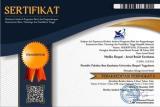HUBUNGAN DUKUNGAN KELUARGA DENGAN PARENTING SELF EFFICACY PADA IBU POSTPARTUM DI KABUPATEN BANTUL
Abstract
The Corelation Between Family Support with Parenting Self Efficacy In Postpartum Mother In Bantul Regency
Background: the postpartum a period of crisis for a mother husband and family so arious changes physically, psychologically and family structure. The process is related to parenting self-efficacy. Parenting self-efficacy is self-confidence and the mother’s ability to caring the baby. Several factors influence the mother’s parenting self-efficacy in caring for her baby, one of which is family support. Objective: this study aims to determine the relationship between family support and parenting self-efficacy of postpartum mothers in Bantul Regency. Methods: this study is a correlation quantitative analytic study with a cross sectional approach with a total sample of 46 respondents taken by accidental sampling technique. Data analyze using Kendall Tau test. Results: most (63%) families support postpartum mothers and most (76,1 %) Postpartum mothers have parenting self-efficacy in the sufficient category. The Kendall Tau result showed a P-value of 0,478. Conclusion: there no relationship between family support and parenting self-efficacy in postpartum mothers in Bantul Regency.
Keywords
Full Text:
PDFReferences
Astutiningrum, S.A., Hapsari, E.D., & Purwanta. (2016). Peningkatan Parenting Self Efficacy pada Ibu Pasca Seksio Sesaria Melalui Konseling. Jurnal Ners. Jilid 11. No.1 Hal 134-141.
Bandura, A. (1997). Social Learning Theory. New Jersey: Prentice Hall, Englewood.
Copeland, D, B & Harbaugh, B, L. (2004). Transition of Maternal Competency of Married and Single Mothers in Early Parenthood. The Journal of Perinatal Education. Vol. 13. No.4. 3-9
Ekasari, R., (2013). Hubungan antara kesiapan Perubahan Peran sebagai Orangtua dengan Tingkat Depresi pada Ibu Postpartum Usia Remaja. Skripsi yang tidak dipublikasikan.Unibraw.
Fitria, N., (2011). Pengalaman Remaja Perempuan Single Parent Menjalani Peran Baru sebagai Ibu di Wilayah Kerja Kecamatan Panjang Kota Bandar Lampung. Tesis. FIK UI.
Friedman, M. (2010). Buku Ajar Keperawatan Keluarga: Riset. Teori dan Praktik. Jakarta: EGC
Hudson, D.B., (2003). Effects of the New fathers Network on First Time fathers Parenting Self efficacy and Parenting Satisfaction during The Transition to parenthood. Issue in Comprehensive Pediatric Nursing
Jones, T., & Prinz, R., (2005). Potential Roles Of Parental self efficacy in Parent and Child Adjusment: A review. Clinical Physichology review
Leahy-Warren, P., (2005). First Time Mothers: Social Support and Confidence in Infant care. Journal of Advanced Nursing
Nakamura, J., & Csikszentmihalyi, M. (2014). The concept offlow. In Flow and the Foundations of Positive Psychology (pp. 239-263). Springer. Netherland.
Reeder, S.J., Martin, L.L., & Koniak-Griffin, D. (2011). Maternity Nursing: Family, Newborn, and Women’s Health Care. 18 th. Ed. Vol.2, Alih bahasa, Jakarta: EGC.
Salonen, A., Kaunonen, M., Astedt-kurku, P., jarvenpaa, A-L., Isoaho, H., & takka, M., (2009). Parenting self efficacy after childbirth. Journal of Advanced Nursing, 65:2324-2336
Young, S.L., (2011). Exploring the Relationship between Parental Self efficacy and Social Support Systems.Digital Repository IOWA STATE University
DOI: https://doi.org/10.35842/mr.v16i2.303
Article Metrics
Abstract view : 248 ViewPDF - 43 View
Refbacks
- There are currently no refbacks.
Copyright (c) 2021 Medika Respati : Jurnal Ilmiah Kesehatan
Medika Respati : Jurnal Ilmiah Kesehatan indexed by:








